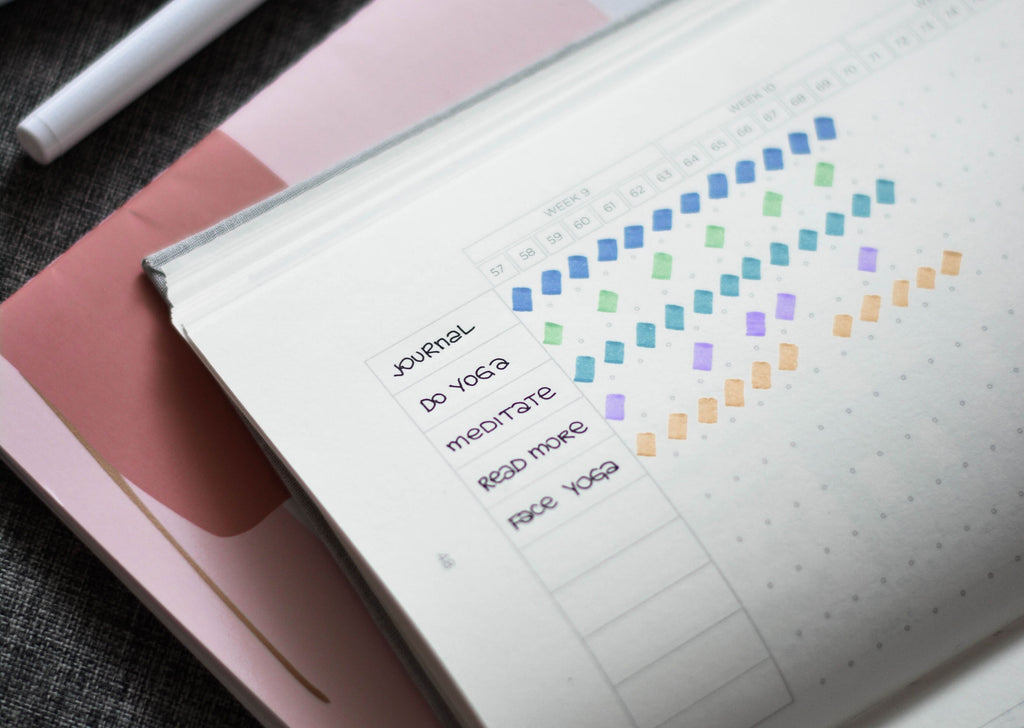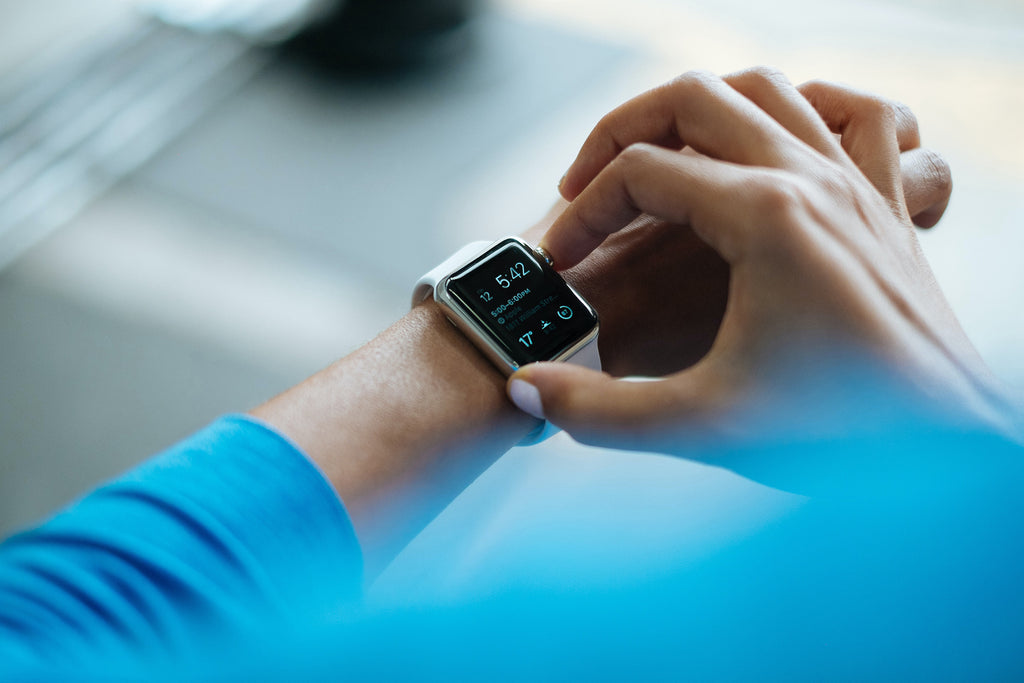Practice Accountability to keep your goal in focus
When we set goals for ourselves, we don’t want them to disappear into the ether. We want to keep track of them. Accountability helps us do that. It demands we answer the question (if only to ourselves), “Did I follow through on this goal?” Accountability makes us responsible for follow-through. It also helps us measure our success and progress—and that helps motivate us. Seeing successes accumulate feels good; it makes us want to work harder and it keeps us engaged, so we don't get distracted from our goals. Let’s take a look at three ways I often use to keep myself accountable. Forming an accountability group is one tool I use whenever I’m working toward a goal that will take longer than a week or two. I especially use it for fitness and health. It can work a couple of different ways. Each member in the group might have individual goals. Someone might want to lose ten pounds, another might want to learn to dance the rumba, and another wants to start a daily workout program. When the group gets together, each member reports on how well she’s been sticking to her goal. Another way to do an accountability group is to pull together a group of people who are all working toward the same goal. For example, I led a group of women through a sugar detox nutritional plan. We were in contact every single day via social media, reporting what we’d eaten, what our struggles were, how we were feeling, and what we’d found helpful. In both kinds of accountability groups, the members of the group encourage each other by holding each other accountable. Another common accountability strategy is to use an online or app-based service to place a bet (Stickk and Beeminder are two services for this). If you don’t do what you say you’ll do, then the money goes to an organization you loathe. The idea here is to put some skin in the game and create a consequence that happens if you don’t follow through. My current favorite app to use on my iPhone is HabitShare, which is an app that allows you to share your goals with your friends and you get texted when they complete their goals and vice versa. I also keep myself accountable by enlisting the help of an individual. When I was getting my master’s degree, I was also working at Bramble Berry full time, so I couldn’t just decide to take a few days off and study. This meant I had to study in the mornings—and I knew that was going to take discipline. To keep myself accountable, I enlisted the help of a very successful entrepreneur. He agreed to take a phone message from me every morning at 5:30, when I was getting up to study. So every morning at 5:30, I left him a message that said, “Hey. I’m up. I’m studying.” This entrepreneur’s success represented something I very much wanted to imitate, and he was someone I respected and admired. Because I didn’t want to let him down, I was motivated to show him my commitment to studying. I never missed a phone call, and his willingness to be my accountability partner helped catapult me far past what I originally thought I could achieve. When you work with others, either in a group or one-on-one, accountability almost always works out to be a two-way street. It’s something we do for each other, to help us go further than we could go alone. This means it’s not about competition; it’s not a question of who can achieve more or of judging someone who stumbles. Instead, accountability is about helping all of us truly live our Best Day Ever, every day. Make It Personal Working on accountability with a group or an individual is an effective way to keep our goals on track, but you can also practice accountability alone. How do you do that? Here are some of my favorite methods: Using a large paper calendar to check off whether I did or didn’t follow through on my goals each day. That paper record keeps me accountable. If you like tech-based options, use one of the many apps available to track your goals. There are many (with more coming out monthly), including GoalsOnTrack, Strides, and Coach.Me. Some of these build in crowdsourced feedback as an enhanced form of personal accountability. Your assignment? Research the apps available. If one of them appeals to you, start using it tomorrow. If not, get yourself a planner or calendar, and keep track of your goals there. Don’t rely on your memory to hold you accountable, because memories can play tricks, convincing us that we’re doing far better than we actually are. You need a visible record to keep you accountable to the goals that will help you fulfill your mission in life. Accountability doesn’t have to feel hard. View this as a game and see how long of a winning streak you can rack up. Have fun! Photo by AbsolutVision on Unsplash
Read morePractice Accountability to keep your goal in focus

When we set goals for ourselves, we don’t want them to disappear into the ether. We want to keep ...
Read moreGive It All You’ve Got — and Then Some
Break free of the self-limitations you’ve imposed on yourself I recently had a mentoring session with a smart woman I’ll call Jan. She had been out of work for a while but had finally landed a job. The salary was 50% less than what she wanted to be paid, but at least it was a job. Only a few weeks into her new work, however, she realized this company had problems; in fact, it was a serious mess. Jan knew she had the skills to help the company dramatically, but she also knew she was not being paid what her help was worth. She didn’t want to be taken advantage of. She worried that her boss would take her efforts and never reward them financially. So Jan asked my advice: should she make a difference in her new role, even though she wasn’t being paid for it—or only do what she was being paid to do? She’d been burned before by unscrupulous employers, and she didn’t want to make herself vulnerable in that way again. At first, I was baffled by the idea that Jan would intentionally hold herself back. But as Jan and I talked about her situation more, we realized something: her dilemma was about her, not her boss and whatever he might or might not do. She could play it safe and hide her true worth, but she would be limiting herself far more than she would be protecting herself. Ultimately, my advice was to try to expand her role and show her value to her employer. If that value wasn’t being recognized, she could look for another job, but in the meantime, she would be growing and learning—and who knows what unexpected opportunities her experience in that setting might lead to down the road? Sometimes we convince ourselves we’re practicing sensible caution, getting into the pool feet first instead of head first, when really we’re just afraid of giving life all we’ve got. The world doesn’t need people who are hiding under a bushel. It wants people to shine and go forth with their special abilities, talents and energy. All of us, though (including me), have experiences that hold us back. Because we were hurt in the past, we try to protect ourselves against those same wounds reoccurring in our current lives. In my case, before I developed my habit of “delusional optimism,” I struggled to move past the experience of feeling rejected by my middle school’s cliques which made me just not want to try (lest I be rejected again). How silly is it that certain things kids said to me so many years ago could have the power to hold me back! (Of course, they didn’t deserve that power, and now I won’t allow them to have it.) All of us have wounds like that, injuries to our self-concepts that we’ve absorbed so deeply we act as though they’re today’s reality. It’s not Suzy Jones from middle school who threatens to derail my success, nor is it Jan’s employers, either past or present, who are holding her back. Ultimately, it’s me who sets limits on what I can do, just as Jan was setting limits on her own achievements. Stop listening to those old voices in your head. You can choose to live a new reality. Whatever flaws you have won’t magically go away—but you can learn to work with them. You can grow in amazing ways, reaching out to your full potential. Isn’t it time to give the world all you’ve got? Make It Personal Ask yourself three important questions: Where do you hold yourself back? What patterns have you learned that have protected you in the past but are hurting you now? How are your beliefs about yourself and others limiting your true potential? If you ask yourself these questions and then commit to answering them by writing longhand for 30 straight minutes, no interruptions, you may be very surprised by your deeply honest response. Reaching these answers is the first part of the battle. You will begin to feel your own potential more fully once you realize what self-limiters you’ve placed on yourself without even knowing it. Photo by Kyle Glenn on Unsplash
Read moreGive It All You’ve Got — and Then Some

Break free of the self-limitations you’ve imposed on yourself I recently had a mentoring session ...
Read moreGet real: Set doable daily priorities
I have only one to three priorities on any single day. That’s it. The temptation is always to give ourselves a whole bunch of daily priorities. The act of writing our long list of 10 or more items feels as though we’ve already accomplished something great. In fact, the longer your list, the less likely you are to achieve the items on it. You’ll be able to use the power of the trudge when you focus on small, achievable steps each day. We also have the tendency to plan for an ideal day, where there are no interruptions, no unplanned events, no emergencies. How many days do we actually have like that during a week? One or two at most, if we’re lucky. So don’t give yourself more than three big, main-thing priorities to accomplish in a day. A big, main-thing priority is deeply personal; for one person, that could be getting the laundry done, for another, it could be making that call you’ve been putting off. When you prioritize the Big Rocks (to use Stephan Covey’s term for the goals and priorities that truly matter), you set yourself up for success rather than failure and frustration. Prioritize, not procrastinate, your must-do items You can (of course) have a whole bunch of little things on your to-do list, but out of those, choose only one to three things that must get done before the end of the day. It’s about prioritizing, not flooding. Then try to check them off before noon. Get them done before your brain is tired—and before anything else demands your attention and knocks you off course. There’s a story that’s been floating around for a while that illustrates this concept. It goes something like this: A professor began class one day by setting an empty jar on his desk and then filling it to the top with rocks. Then he turned to the class and asked, “Is the jar full?” They agreed that it was. But then the professor poured a bag of pebbles slowly into the jar, shaking the jar a little while he did so. The pebbles rolled into the open areas between the rocks, and the entire bag fit into the jar. “Now is the jar full?” the professor asked the class. They laughed and agreed that now the jar was truly full. The professor then picked up a bag of sand and slowly poured it into the jar. As the sand sifted down through the cracks between the rocks and pebbles, the professor was able to pour the entire bag into the jar. Then the professor dumped the entire contents of the jar out onto his desk, and he asked the class, “If I told you to put this mess back into the jar, would you be able to do it?” After a moment, one student said, “Only if we put the stones in first, then the pebbles, and finally the sand. Otherwise it won’t all fit.” “Exactly,” said the professor. “And your lives are the same. If you don’t put the big rocks—the things that are most important—into your life first, you won’t have time for them in your life. But when you do them first, then you’ll be able to fit in smaller things around them once they’re done.” The moral of the story is clear: Creating a daily plan based initially on a few main priorities allows you to fit even more into your life later. It puts you in control of your time, and it enables you to shape the life you want to lead! Business Application: Rethink how you handle email Setting priorities in the business world is essential, and that means taking control of your time by managing how you handle your email. If it’s at all possible, attend to your daily priorities (your “rocks”) before you check your email. E-mail is a necessary part of the day—but it can also be an enormous time waster. You could be sitting all day staring at your computer screen, doing nothing but reading and answering e-mail. Responding to emails all day long is a reactive rather than proactive way to handle your life; you’re constantly responding to others instead of having control over your own time. There’s an old saying: “If the first thing you do when you wake up each morning is eat a live frog, nothing worse can happen for the rest of the day.” That’s probably true. Author Brian Tracey has said that your frog should be the most difficult task on your to-do list; the one you’re most likely to procrastinate on. Because if you accomplish that first, it will give you energy and momentum for the rest of the day. If you don’t and you let it sit there while you do other unimportant things, it can drain your energy. William James, a famous psychologist said, “Procrastination is attitude’s natural assassin. There is nothing so fatiguing as an uncompleted task.” Make It Personal List one to three priorities for each day this week. Each of these “trudge steps” should connect specifically and directly to your larger long-term goals. Commit to getting these smaller tasks accomplished no matter how long the rest of your to-do list is for that day. For example, this might be writing a proposal for a client, pricing out a product line, or pitching a product to stores. All of these are key behaviors to get you to your final destination, even if they’re not particularly fun, easy or creative. Avoid the temptation to put them off to do another day. List some of the activities in your life you should consider “sand” to be fit in after other more important things are done: At the end of the week, look back and assess what you accomplished. Did you get more or less accomplished this week than usual? Were you able to distinguish between the rocks, pebbles and sand in your life? Photo by Wil Stewart on Unsplash
Read moreGet real: Set doable daily priorities

I have only one to three priorities on any single day. That’s it. The temptation is always to giv...
Read moreSuccess can be Systematized
In a recent post, I talked about how success depends on discipline. But I can hear some of you saying, “I’m one of those people with no willpower. I just don’t have it in me to be disciplined. My life is too busy. I’m too tired. I’m too depressed. I’m too heavy or too sick or too poor or too whatever.” Great news—whatever you’re telling yourself probably isn’t true. You’re not too anything to make small changes—and small changes accumulate into big changes when compounded with the magic of time. Discipline comes a lot easier when you apply it to smaller pieces of your life. Simply start with yes or no Don’t ask discipline to do the heavy lifting required to achieve goals like, “I will lose 50 pounds,” or “I will change my ho-hum marriage into a happy, satisfying relationship.” Instead, take a look at those big goals and figure out how you could break them down into tiny, daily, achievable tasks. Those mini-goals are how you systematize success. One of the good things about small, bite-size goals is that you can easily measure them. Measuring success in this way is often as simple as a yes or no answer. Did I do it or did I not? This goal is small and doesn’t seem overwhelming to do daily. A seemingly trivial goal I set for myself six years ago was to improve my gum health. I systematized this by committing to flossing every single day. I told everyone that I was going to floss every day; I put it on my blog; and every day I checked off a simple yes or no. The daily goal was so tiny—it takes about a minute to floss your teeth—that I didn’t feel discouraged every time I thought about doing it. And the more yeses I could check off, the better I felt about myself. Those small, daily victories gave me momentum to keep going. As the years went by, my dentist at first was measuring my gum health at 3 on a scale of 0 to 5 for periodontal decay . . . then I was down to 2 . . . then 1 . . . and at my last visit, I was at 0. That’s success one little “yes” at a time! Big goals start with small successes The same principle of small, systematized, daily successes can be applied to far grander goals, too. Do you want to get in shape? Then instead of taking on a rigorous exercise program, maybe you commit to simply moving your body, in one way or another, for 20 minutes every single day, no excuses. Do you want to improve your health? Something as small as drinking eight glasses of water every day could make a real difference in your overall physical well-being. So could going to bed a half hour earlier. Do you want to learn a new language? After spending just 15 minutes a day practicing for one year, you could find yourself surprisingly good at speaking the language.. Another good thing about systematizing success is that eventually those tiny daily victories turn into habit. I no longer have to remind myself to floss my teeth, because it’s a habit—and habits don’t take nearly as much energy and effort as willpower. Willpower is white-knuckling it. Habits get easier and easier to follow the longer you use them. Think about it. I bet you don’t have to decide whether to brush your teeth every morning. It’s not a big argument you have to have with yourself every day to make yourself squeeze that tube of toothpaste. You just do it because it's a habit. There’s very little energy required to maintain basic dental hygiene. Habits can also be destructive, of course. But why not take advantage of the positive power of habit? Systematize your success into small victories you achieve each and every day, and you’ll find discipline will come far more easily. Your best day ever will be within your reach—every day. Make it personal What is a BIG goal you’d like to achieve? Now think about small daily tasks that will help you get closer to that goal. List three you can commit to doing daily over the next month. Measure your success with these goals by placing a check mark after one, each day that you achieve it. You can put these check marks in your paper planner, daily scheduler notepad or use an app on your phone. My favorite app to use is HabitShare, which can also be used as an accountability check-in with friends and "accountabuddies," virtually, too. After a month, how many checkmarks do you have? Are you finding these small tasks easier to do yet? Can you commit to these tasks for another month—or six months? A classic mental trick to get you past the brain’s natural desire to shrug off new habits is to promise yourself a reward at the end of the time period with certain performance. Photo by Prophsee Journals on Unsplash
Read moreSuccess can be Systematized

In a recent post, I talked about how success depends on discipline. But I can hear some of you sa...
Read moreTake care of your body to live your best life
As busy as our lives are, it’s easy to put our own health last. After rushing around all day, taking care of a million different things in a zillion separate directions, all we want to do is eat some junk food, have a drink, and watch some mindless TV. It seems harmless enough. It’s not. We hurt ourselves when we neglect our bodies. We don’t give our bodies what they need to function at top capacity. As a result, every area of our lives suffers. Needless to say, if you’re run-down and sick with a cold, you’re probably not going to have your Best Day Ever. It’s hard to choose happy when you’re exhausted. We forget that our brain is a body part, just as much as our stomach and lungs. Simply put, our brain doesn’t work as well when we’ve deprived it of the many things it needs to keep up with the many functions it performs. We’re less efficient and not as creative; we don’t think as clearly; and we’re more prone to emotional upsets. I’m not saying that if we eat right, exercise, and get the sleep we need, we’ll never get sick. If we make a plan to meet our bodies’ needs, though—and carry through on it—we will be healthier. With better nutrition, regular exercise, and more sleep, our immune systems grow stronger. We’re able to cope with stress at home and at work better. This information about health is nothing new—most of us already know the basics of a healthy lifestyle. Yet knowing doesn’t equal action. Action comes in different forms, but it always starts with a plan to make it happen. When you make your yearly, weekly, and daily plans, include your body’s needs too. The adage “Health is Wealth” is a truism for a reason; your health truly is a ‘Big Rock’ to prioritize around. Schedule exercise. Plan your meals. Make your eating decisions—groceries, snacks, work lunches, and dinner engagements—ahead of time, when you’re not hungry. Commit to a certain number of hours of sleep per night. In addition to the framework of a plan, be thoughtful about the tiny, everyday choices you make. For example, who hasn’t wanted to stay up past a normal bedtime to read a magazine or finish a book? I know I’m guilty! This is one of those tiny, everyday choices that makes a difference. Going to bed on time to get seven (or more) hours of sleep so that the next day goes better is a seemingly insignificant choice that ends up making a big difference in the end. On Dr. Christiane Northrop’s website, she recommends we think of ourselves as our “own best mothers.” As parents, we usually work hard to make sure our children are as healthy as possible. We monitor snacks, pack lunches, make healthy dinners; we send our kids off to bed at a regular time most nights; and we give them opportunities to run around and play. Then we fail to give ourselves the same nurturing care. However, if we take Dr. Northrop’s advice to “treat yourself like an ideal mother would,” we will think of ourselves as an equally important member of the family, someone who deserves our utmost care and commitment. Feeling strong and happy is a powerful motivation for continuing to say ‘yes’ to healthy habits. The foundation for a Best Day Ever lifestyle is adequate sleep, low to no alcohol, no sugar, appropriate hydration, essential fatty acids and vitamin D intake, nutrient-dense “ancient” grains (ditching processed gluten grains), and getting twenty minutes of intentional movement daily. Taken individually, all of these things seem doable—and they are. Together they form a powerful system that’s the baseline for more energy, health, vitality and longevity. Make It Personal Over the next week, keep a record of how much sleep you get, what you eat, and how long you move your body each day. Then make a note of how you felt during the day, using a scale of 1 to 10 for energy level, mental focus, and mood. At the end of the week, look at this record. If you’re seeing a lot of numbers that are 5 or less in the energy, focus, and mood columns, you may not be taking adequate care of your body. Pay attention to what affects you negatively: Too much sugar instead of complex carbohydrates? Skipping meals? Not enough sleep? You can use a habit tracking app to help you make this super easy. And these apps can make it simple and fun to develop the positive habits – like drinking more water and getting daily movement – you can build on as you strive for your Best Day Ever. Photo by Luke Chesser on Unsplash
Read moreTake care of your body to live your best life

As busy as our lives are, it’s easy to put our own health last. After rushing around all day, tak...
Read more